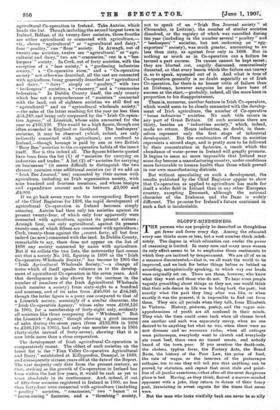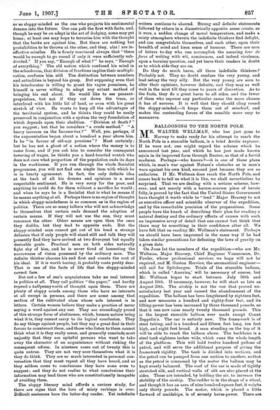SLOPPY-MINDEDNESS.
111HE persons who can properly be described as thoughtless 1 get fewer and fewer every day. Among the educated every one thinks more or less, but a vast number think indefi- nitely. The degree in which education can confer the power of reasoning is limited. In many men and many more women its only effect seems to be to emphasise those sentiments to which they are inclined by temperament. We are all of us in a measure discontented,—that is, we all want the world to be improved, and we look for better things before or behind MI according, metaphorically speaking, to which way our beads were originally set on. There are those, however, who know what they want and those who do not. To hear some people vaguely grumbling about things as they are, one would think that their sole desire in life was to bring back the past; but exactly what the past they long after was like, or when exactly it was the present, it is impossible to find out from them. They mix all periods when they talk, from Elizabeth to Victoria. History, pictures, poetry, and the vague mis- apprehensions of youth are all confused in their minds. They wish the time could come back when all classes loved one another and each was separately merry, when no one desired to be anything but what he was, when there were no new diseases and no nouveaux riches, when all cottages were picturesque, everybody went to church and everybody ate roast beef, them were no tinned meats, and nobody beard of the town poor. If you mention the death-rate, the cholera, typhus fever, the Factory Acts, the Bread Riots, the history of the Poor Law, the price of food, the rate of wages, or the interiors of the picturesque cottages, ten to one they will tell, you that anything can be proved, by statistics, and repeat that most stale and point- less of all jocular assertions,—that after all the most dangerous place is bed. Having, as they think, floored a narrovr-rninded opponent with a joke, they return to dream of their fancy past, luxuriating in sweet regrets for the times that never were.
But the man who looks wistfully back can never be so silly
or so sloppy-minded as the one who projects his sentimental dreams into the future. One can pelt the first with fade, and, though he may be an adept in the art of dodging, some may get home; at least one may hope to terrorise him with the thought that the books are against him. But there are nothing but probabilities to be thrown at the other, and they, alas ! are in- effective missiles. He is firmly convinced always that "there would be enough to go round if only it were sufficiently sub- divided." If you say, "Enough of what ? " he says, "Enough of everything." The old notion which confused his mind in the schoolroom, that division of fractions implies their multipli- cation, confuses him still The distinction between numbers rata actualities is beyond his grasp. But supposing even that his interlocutor is willing to grant his vague premisses, he himself is never willing to adopt any extant method of bringing his end about. He would like to see peasant- proprietors, but not if they cut down the trees, or interfered with his little bit of land, or even with his great stretch of view. He wants to keep ell the advantages of the territorial system, and he thinks they could be easily preserved in conjunction with a system the very foundation of which depends upon their abolition. "Division at death ? " you suggest; but that he considers "a crude method." "A heavy increase on the Income-tax ? " Well, yes, perhaps, if the augmentation began about a hundred a year above him. Is he "in favour of old-age pensions"? Most certainly; but he has not a ghost of a notion where the money is to come from, and if you•ask him to consider the consequent lowering of wages, lie thinks you a hard-hearted wretch who does not care what proportion of the population ends its days in the workhouse. If you run through the whole Socialist programme, you will not find one single item with which lie is in hearty agreement. In fact, the only definite idea at the back of all his dreams and opinions is a most respectable sentiment. He is very sorry for the poor, and anything he could do for them without a sacrifice he would ; and when he says he is a Socialist that is what he means if lie means anything at all. Perhaps there is no region of thought in which sloppy-mindedness is so common as in the region of politics. There are so many talkers who will not acknowledge to themselves that certain ends demand the adoption of certain means. If they will not use the one, they must renounce the other. Other means are open than the ones they dislike, but they lead to opposite ends. But the sloppy-minded man cannot get out of his head a strange delusion that if only people will stand still and talk they will presently find they hare arrived at two divergent but equally desirable goals. Practical men on both sides naturally fight shy of him, and he is never tired of lamenting the narrowness of vision possessed by the ordinary man. The definite thinker chooses his end first and counts the cost of his ideal. If it is worth having, it probably costs pretty dear. That is one of the facts of life that the sloppy-minded cannot face.
But not a few of one's acquaintance take no real interest in polities at all. They call politics "the paper," and hardly expend a halfpennyworth of thought upon them. There are plenty of sloppy minds among those who have no interests at all except in persons, and there are some among that section of the cultivated class whose sole interest is in letters. Certain women believe they make a practice of never saying a word against any one. They are exceedingly proud of this strange form of abstinence, which, -human nature being what kis, they cannot carry to its logical conclusion. They do say things against people, but they say a great deal in their favoin to counteract them, and those who listen to them cannot think what it is they really mean, and generally conclude most utijustly that they are spiteful persons who want to take away the character of an acquaintance without risking the consequent odium. In nineteen cases out of twenty this is quite untrue. They are not very sure themselves what it is they do think. They are so much interested in personaLcOn- vernation that they must repeat all they have heard, and as they seldom come to conclusions they have none even to suggest ; and they do not realise to what conclusions their information may lead those who are constitutionally incapable of avoiding them.
The sloppy literary mind affords a curious study, for there are signs that the love of misty verbiage is over. Difficult sentences bore the latter-day reader. Yet indefinite writers continue to abound. Strong and definite statements followed by others in a diametrically opposite sense create, as it were, a sudden change of moral temperature, and make a misty atmosphere wherein the indefinite thinkers find delight, and can congratulate themselves, and each other, upon their breadth of mind and keen sense of humour. There are men of letters to-day who can accomplish the amazing tour de force of writing with wit, conciseness, and indeed virulence, upon a burning question, and yet leave their readers in doubt as to which side they are on.
Do they do much harm, all these indefinite thinkers ? Probably not. They no doubt confuse the very young, and lead astray the very silly. But the very young are sure to alter their opinions, however definite, and they may as well wait in the mist till they come to years of discretion. As to the fools, they do a great harm to all sides, and the fewer of them who espouse any particular cause the more chance it has of success. It is well that they should cling round the sloppy.minded,—it keeps them out of mischief, and makes the contending forces of the sensible more easy to manoeuvre.







































 Previous page
Previous page